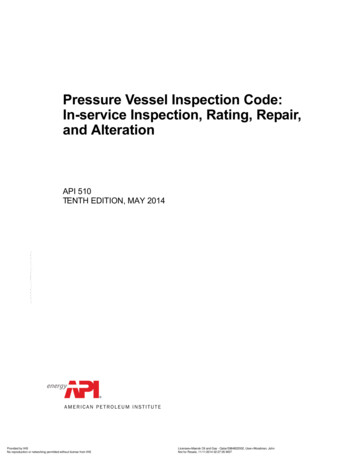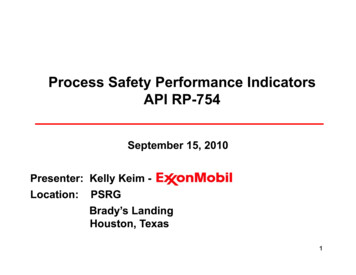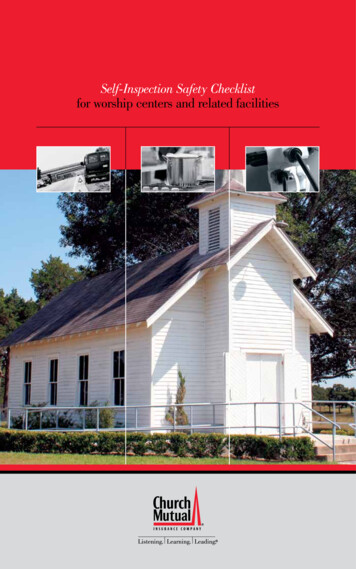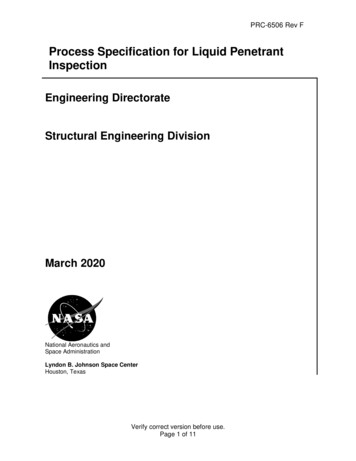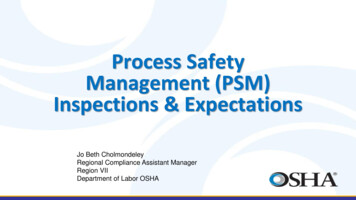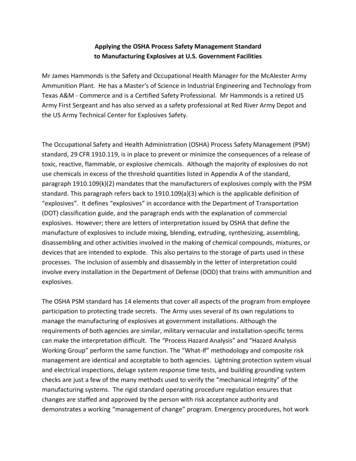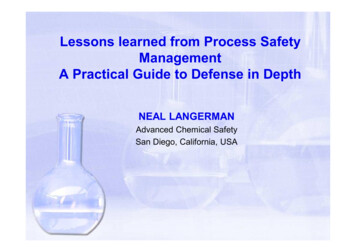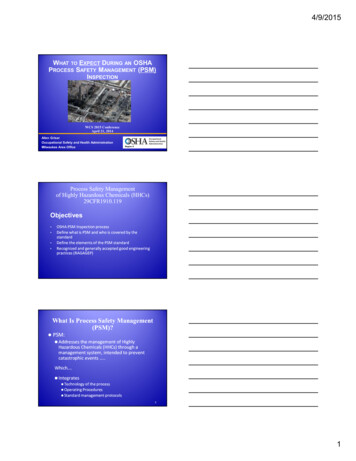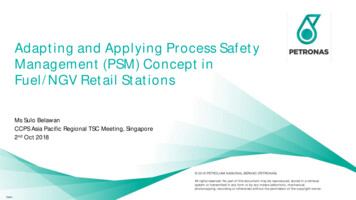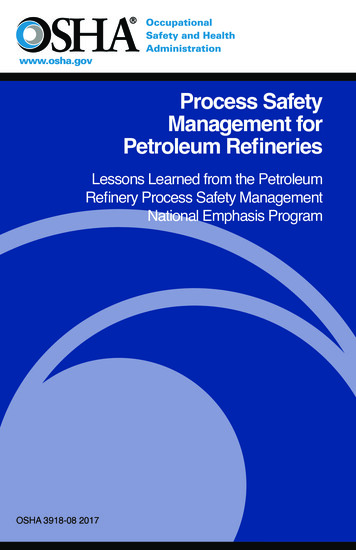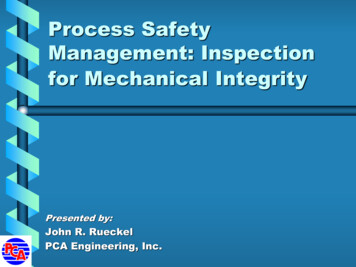
Transcription
Process SafetyManagement: Inspectionfor Mechanical IntegrityPresented by:John R. RueckelPCA Engineering, Inc.
Process SafetyManagement:Inspection for Mechanical Integrity –Applying Industry Standards to meetinspection requirements, mostspecifically those developed by theAmerican Petroleum Institute (API)PCA Engineering, Inc.Pompton Lakes, NJ(800) 666-7221
Process SafetyManagement Process Safety Management (or PSM) is a program based on OSHA’sHazard Communications Standard 29 CFR 1910.1200(i)(1) through 1910.1200(i)(12) The PSM standard applies to companies that deal with : Any of more than 130 specific toxic and reactive chemicals inlisted quantities Flammable liquids and gases in quantities of 10,000 pounds ormore Was required to start by May 26, 1994 and fully implemnted (in termsof evaluation) by May 26, 1997PCA Engineering, Inc.Pompton Lakes, NJ(800) 666-7221
ApplicationsThe owner/operator of a facilitydetermines site applications through theperformance of a Process Hazard Analysis(PHA), and compiling written processsafety information. From the point of viewof the process and associated information,this should include:PCA Engineering, Inc.Pompton Lakes, NJ(800) 666-7221
ApplicationInformation on the hazards of the highly hazardouschemicals in the process shall consist of at least thefollowing: Toxicity, Permissible exposure limits, Physical data, Reactivity data, Corrosivity data, and Thermal and chemical stability data, andhazardous effects of inadvertent mixing of differentmaterials.PCA Engineering, Inc.Pompton Lakes, NJ(800) 666-7221
ApplicationInformation on the technology of the process must include at leastthe following: A block flow diagram or simplified process flow diagram, Process chemistry, Maximum intended inventory, Safe upper and lower limits for such items as temperatures,pressures, flows or compositions, and An evaluation of the consequences of deviations, includingthose affecting the safety and health of employees.PCA Engineering, Inc.Pompton Lakes, NJ(800) 666-7221
ApplicationInformation on the equipment in the process must include thefollowing: Materials of construction, Piping and instrument diagrams (P&IDs), Electrical classification, Relief system design and design basis, Ventilation system design, Design codes and standards employed, Material and energy balances for processes built after May 26,1992, and Safety systems (e.g., interlocks, detection, or suppressionsystems).PCA Engineering, Inc.Pompton Lakes, NJ(800) 666-7221
Mechanical Integrity PSM is really a mechanical integrity program PSM mechanical integrity requirements apply to the followingequipment: Pressure vessels and storage tanks; Piping systems (including piping components such as valves); Relief and vent systems and devices; Emergency shutdown systems; Controls (including monitoring devices and sensors, alarms,and interlocks); and Pumps.PCA Engineering, Inc.Pompton Lakes, NJ(800) 666-7221
PSM InspectionRequirements Inspection and testing must be performed on processequipment, using procedures that follow recognized andgenerally accepted good engineering practices. The frequency of inspections and tests of processequipment must conform with manufacturers’recommendations and good engineering practices, or morefrequently if determined to be necessary by prior operatingexperience.PCA Engineering, Inc.Pompton Lakes, NJ(800) 666-7221
Engineering BestPractices and StandardsThe petroleum industry began developing formal standardsfor inspection in the late 1980’s, releasing the first standard, API 653in 1992.The primary inspection standards applied include: API 653 for the inspection of bulk storage tanks API 570 for the evaluation of piping API 510 for the evaluation of pressure vesselsThese standards have been widely applied outside of thepetroleum industry, to industry in general, especially the chemicaland utility sectorsPCA Engineering, Inc.Pompton Lakes, NJ(800) 666-7221
Inspection StandardsApplicationPCA Engineering, Inc.Pompton Lakes, NJ(800) 666-7221
API 653 – Bulk StorageTanksPrimarily applies to field erected tank, though can be usedfor factory fabricated tanks.The standard establishes inspection requirements, visualinspection checklists, applicable non-destructive testing, anda means to determine inspection intervals.Provides the for determination of inspection intervals basedon corrosion rates and minimum remaining thicknessesPCA Engineering, Inc.Pompton Lakes, NJ(800) 666-7221
API 653 – Bulk StorageTanksTypical Application includes bulk storage of: Fuel oil, gasoline or other petroleum products Process chemicals including solvents, acids or caustics Waste products from the process Waste water prior to or after treatment, or also as atreatment process vessel Clean or potable waterPCA Engineering, Inc.Pompton Lakes, NJ(800) 666-7221
API 653 – Bulk StorageTanksInspections typically include: Visual inspection per a defined checklist Non destructive testing of the tank, including: Ultrasonic thickness gauging of the shell, floor and appurtenancessuch as nozzles, Magnetic Flux Leakage Floor Scanning: a means to evaluate a largepercentage of the floor area for localized corrosion, especially on thesoil side Leak testing of floor lap welds by vacuum box testing Magnetic Particle or Dye Penetrant testing as necessary Settlement surveys to evaluate orientation and foundation conditionsPCA Engineering, Inc.Pompton Lakes, NJ(800) 666-7221
API 653- Bulk StorageTanksData from the report is complied andevaluated in accord with the standard.Thickness data is used to establishcorrosion rates and compute inspectionintervals in reference to the minimumremaining thicknesses (MRT) as defined inthe standard.PCA Engineering, Inc.Pompton Lakes, NJ(800) 666-7221
API 653 – Bulk StorageTanksInspection Intervals: In-service (external) – every 5 years orhalf corrosion rate life, whichever is less Out-of-service (comprehensive internaland external) – every 20 years or corrosionrate life to the floor MRTPCA Engineering, Inc.Pompton Lakes, NJ(800) 666-7221
API 570 – PipingDeveloped to provide a standard for the inspection ofproduct piping in bulk storage facilities (tank farms),refineries and chemical facilitiesExtended widely to various processes, power generationfacilities and transmission and distribution pipingStandard implements focused inspection to identify andevaluate for specific modes and areas of failure: early“risk-based’ inspection.PCA Engineering, Inc.Pompton Lakes, NJ(800) 666-7221
API 570 – PipingImplements various forms of visual and non-destructivetesting, focusing on likely points of failure. These areasinclude: Soil-air interfaces (the transition point fromunderground to above ground piping) Corrosion under insulation (CUI) Dead-leg corrosion Etc.PCA Engineering, Inc.Pompton Lakes, NJ(800) 666-7221
API 570 – PipingClassifies piping by “risk” with those lines generating thehighest potential of creating an immediate emergencyreceiving the most frequent inspection.The risk parameters include: High-hazard chemicals in terms of danger to personneland/or environment Likelihood of reaching waterways or public throughwaysPCA Engineering, Inc.Pompton Lakes, NJ(800) 666-7221
API 570 – PipingThe available inspection data (including ultrasonicthickness, pitting depth and other visualinspection results) are evaluated for corrosionrate, and compared to calculated minimumthicknesses based on pressure capacity and/orlikely perforation time frame.PCA Engineering, Inc.Pompton Lakes, NJ(800) 666-7221
API 570 – PipingInspection interval determinations are based on: Corrosion rate and remaining life calculations Piping service classifications Applicable jurisdictional regulations andrequirements Judgment of the inspector, engineer, corrosionspecialist and owner.PCA Engineering, Inc.Pompton Lakes, NJ(800) 666-7221
API 510 – PressureVesselsThis standard further extends the concept of risk-basedinspection to allow for focusing of the inspection effort. In additional,the standard extends beyond API: ASME and API join to provide ageneral standard for non-fired pressure vessels. The API 510 Standardis also and ANSI standardBased on this standard, the inspector and engineer are givenmore tools to evaluate maximum allowable working pressure(MAWP) and other pressure vessel design parameters.PCA Engineering, Inc.Pompton Lakes, NJ(800) 666-7221
API 510 – PressureVesselsPrimarily intended to inspect vessels designed to applicable standard,such as the ASME Boiler & Pressure Vessel Code, but can beextended to non-standard vesselsExamples of vessels might include: Steam storage tanks such as for feed water, de-aerator andcondensate tanks. High-temperature hot water may also be affected Pressurized chemical tanks such as ammonia Hydraulic vesselsPCA Engineering, Inc.Pompton Lakes, NJ(800) 666-7221
API 510 – PressureVesselsAir storage tanks, while not generally defined as underPSM requirements, are increasingly being included infacility inspection programs.This may include: Air-start and instrumentation vessels Air service vessels such as those used to power toolsPCA Engineering, Inc.Pompton Lakes, NJ(800) 666-7221
API 510 – PressureVesselsImplements the generation of an inspection plan that is to include: Defining the types of inspection required, e.g. external, internal Identify the next inspection date for each inspection type Describe the inspection and NDT techniques Describe the extent and location of inspection and NDT Describe the surface cleaning requirements for inspections andexaminations Describe the requirements for any needed pressure, e.g. type of test,test pressure and duration Describe any required repairsPCA Engineering, Inc.Pompton Lakes, NJ(800) 666-7221
API 510 – PressureVesselsThe results of ultrasonic thickness data, pressure tests and visualinspection are calculated for corrosion rate and compared the requiredthickness for the MAWP of the vessel and heads. The intervals shallnot exceed one half of the remaining life of the vessel or 10-years,whichever is lessRisk Based Inspection (RBI) techniques for inpection and remaininglife can also be applied at the discretion of the inspector, pressurevessel engineer and owner.Local regulations for pressure vessels may apply nad effect inspecitonintervals.PCA Engineering, Inc.Pompton Lakes, NJ(800) 666-7221
Preparing for aninspectionThe ability to complete aninspection safely and accurately,especially and internal inspection,can be effected by many factorsProper preparation is essential!PCA Engineering, Inc.Pompton Lakes, NJ(800) 666-7221
Inspection PreparationA team experienced in cleaning above ground storage tanks, includinghaving knowledge of the material stored, best performs the tank cleaning.Many times this is a tank-cleaning contractor. The cleaning not onlyrequires the removal of all product, but the removal of all sludge, scale, orother material that might prevent the inspector from seeing the metal ornon-metallic material that is the tank. This may mean that the tank floorand lower shell should be sand blasted or high pressure water-blasted.Note that a high-pressure water blast is typically performed at 10,000 PSIor over, and not with the typical equipment available from the local homeor rental center. Remember: You can’t inspect what you can’t see!PCA Engineering, Inc.Pompton Lakes, NJ(800) 666-7221
Inspection PreparationPlease strongly consider having the cleaning reviewed by a CertifiedMarine Chemist or other qualified Industrial Safety professional. Theseprofessionals can provide review of the cleaning results, increase thelikelihood of a safe project completion, and note any special site orequipment requirements. This is especially important for tanks storingsomething other than light distillate petroleum products.PCA Engineering, Inc.Pompton Lakes, NJ(800) 666-7221
Inspection PreparationWhile the PCA Engineering field team will complete their own ConfinedSpace Entry Permit, we will abide by your requirements, as well. As theowner/operator of the confined space, OSHA dictates that your programdesignate the responsibility of the entrant, attendant, supervisor and rescuepersonnel. When retaining a repair company, please ensure that the firm and theirsite supervisor are qualified to meet API 650, 653 and ASME Section VIIIstandards. All work must be completed to meet these standards in order toprovide your facility the best service and meet regulatory obligations. PCA Engineering, Inc.Pompton Lakes, NJ(800) 666-7221
Inspection Goals andResultsvisualPCA Engineering, Inc.Pompton Lakes, NJ(800) 666-7221U/T&NDTDocumentation& RecordsSafety
Reference DocumentsIn addition to the regulation, the following documents provideguidance and reference materials: OSHA 3132 – Process Safety Management OSHA 3133 – Process Safety Management Guidelines forCompliance API 653 – Tank Inspection, Repair, Alteration andReconstruction API/ANSI 510 – Pressure Vessel Inspection Code: In-ServiceInspection Rating, Repair, and Alteration API 570 - Inspection, Repair, Alteration, and Re-Rating of InService Piping SystemsPCA Engineering, Inc.Pompton Lakes, NJ(800) 666-7221
Thanks for YourAttention and Interest!John R. RueckelAPI 653 No. 23316API 510 No. 25451API 570 No. 24437API 580 No. 37615PCA Engineering, Inc.(973) 616-4501 x12(973) 616-4451 fax(973) 703-2253 cell
Mechanical Integrity PCA Engineering, Inc. Pompton Lakes, NJ (800) 666-7221 PSM is really a mechanical integrity program PSM mechanical integrity requirements apply to the following equipment: Pressure vessels and storage tanks; Piping systems (including piping components such as valves); Relief and vent systems and devices;

